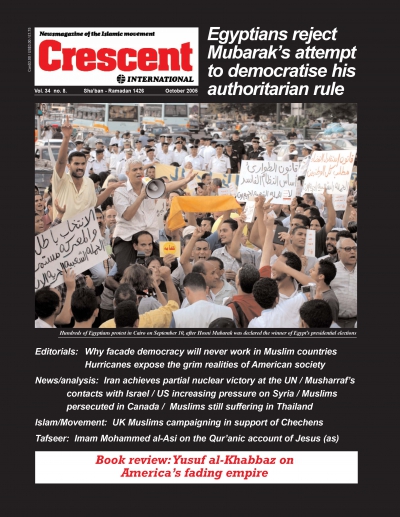Crescent International Vol. 34, No. 8
Newsmagazine of the Islamic movement
Iqbal Siddiqui
Sha'ban, 1426 2005-10


In some parts of Iran there is an "American problem." The so-called "upper classes" of Iranian society are infatuated with everything American, and that infatuation trickles down to the ‘lower classes', who then either succumb to the American temptation or resist it.

After the Empire: The Breakdown of the American Order by Emmanuel Todd. Translated by C. Jon Delogu. London: Constable, 2004. Pp. 243. £8.99. By Yusuf al-Khabbaz As American neo-conservative academics, policy experts, government officials and corporate media continue to proclaim the "new American century," those on the American left lament the emerging imperial power of the US. Although they are viciously opposed to one another on many points, both parties agree that America is "the sole superpower" in the world today, and that the emerging American empire is an inevitability to be either celebrated or decried.

When Egyptian president Hosni Mubarak announced earlier this year that last month’s presidential elections would be the first ever to permit other candidates to stand directly against him, the announcement was greeted in the West as part of the “democratic dividend” of Bush’s invasion of Iraq. According to the American neo-conservative mythology, one of the reasons that Muslims are so anti-American is that they live under repressive dictators who blame the West for all that is wrong in the world. In keeping with this remarkable understanding of contemporary history, the US’s main object in invading Iraq was to restore freedom for the Iraqi people and make Iraq a beacon of democracy in the Muslim world, and an inspiration to other Muslim peoples around the world to embrace freedom, democracy and the altruistic American hegemon that can provide both.

When Hurricane Katrina blew into New Orleans in the end of August, it blew away a lot more than just the lives and livelihoods of a city full of people. It should also have destroyed, for once and all, any illusions anyone still had about the true nature of American society and politics.

Afghanistan’s thrice-postponed presidential election, due to be held on October 9, is turning into a grand farce. Far more people are registered than are eligible to vote, though that hardly cramps the American installed-puppet Hamid Karzai’s style...

After the Islamic Revolution, Imam Khomeini made the liberation of Palestinian a key issue for the Islamic State, declaring the last Friday of Ramadan to be Yaum al-Quds. Here we reprint a paper by DR KALIM SIDDIQUI on “the road back to Palestine” and the role of the Islamic State. This paper was presented at a conference on Palestine in Tehran in 1991...

Although the Chechen people have suffered immensely in the last decade, their cause has been overlooked in recent years. HAJIRA QURESHI reports on the work of the Save Chechnya Campaign, a new support group established in the UK...

At a time when Muslims are struggling to make sense of the world we live in and the situation facing us, ZAWAHIR SIDDIQUE turns for inspiration to the writings of one of the great Muslim thinkers of the modern era...

There were a number of anti-Mubarak demonstrations in Cairo in the days following the presidential elections on September 7, as Egyptians realised that the much-vaunted elections had taken place and nothing had changed; in fact, that Hosni Mubarak and his supporters had consolidated their position by being able to claim a measure of democratic legitimacy for the president’s continuing authoritarian rule.

The US occupation of Iraq, which has destabilised the country, driving it into effective civil war, may have unsettling consequences for neighbouring Syria. US president George W. Bush is exerting strong pressure on Damascus to cooperate with Washington's colonial schemes, to end its links with Lebanon, and to help the UN's enquiry into the murder of Lebanon's late ex-prime minister, Rafique Hariri.

One year after the massacre of Muslims by Thai security forces during Ramadan last year, the government of Thaksin Shinawatra is hoping that it will be a case of so much water having flowed under the bridge. The truth is that so many Muslim lives were lost that the southern tip of Thailand has become the most dangerous place in the region after Aceh and Mindanao for Muslims.

In recent months the world's richest countries, led by the US and Britain, have been claiming noisily that they plan to have the world's poorest regions, particularly Africa, lifted out of poverty; they also intend to improve human rights there, they say.

Iran won what may be regarded as a partial and temporary victory at the International Atomic Energy Commission (IAEA) on September 24, when the UN nuclear agency’s board refrained from acceding to American demands that it immediately refer Iran to the UN Security Council for alleged breaches of the nuclear Non-Proliferation treaty (NPT).

That Pakistan's president, General Pervez Musharraf, shook hands with a war criminal like Ariel Sharon of Israel—better known as the Butcher of Beirut—was bad enough; it was even worse that he chose to do so on the twenty-third anniversary of the Sabra and Shatilla massacres (September 14-16).

As if Hurricane Katrina had not caused quite enough damage, Rita came roaring in and swept across Louisiana and Texas, putting out of action more than 25 percent of the US's oil-refining capacity.

Turkey has been a trusted and valued member of NATO for a long time, as it has been an associate member of European economic organisations. Turkey first applied to join what was then the EEC in 1959 and signed an association agreement with it in 1963, which strongly implied that it would later become a member.
